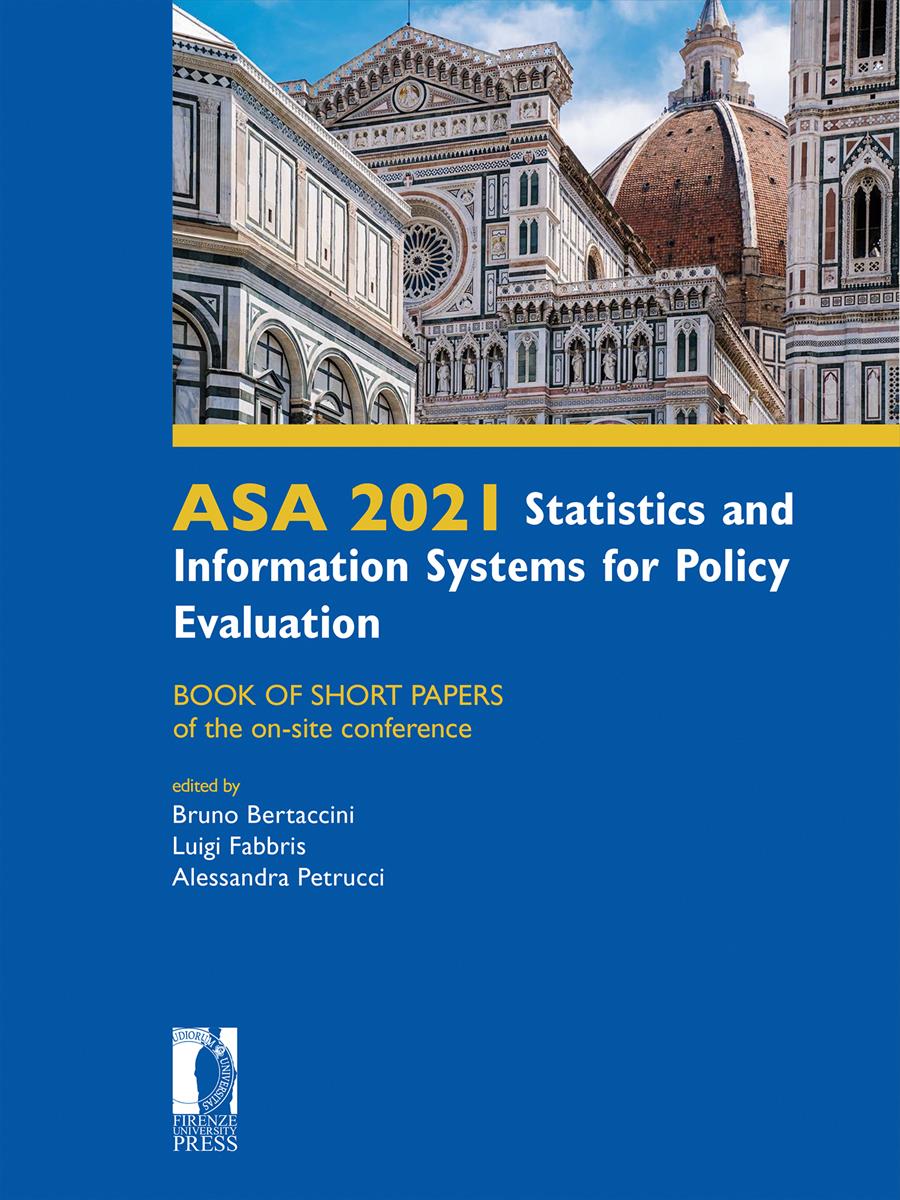- ASA 2021 Statistics and Information Systems for Policy Evaluation
- Edited by Bruno Bertaccini, Luigi Fabbris, Alessandra Petrucci
Emergency remote teaching: an explorative tool
- Emma Zavarrone
- Maria Gabriella Grassia
- Rocco Mazza
- Alessia Forciniti
- © 2021 Author(s) |
- CC BY 4.0
- DOI: 10.36253/978-88-5518-461-8.12
The worldwide rapid spread and severity of the infectious disease caused by Coronavirus forced the WHO to declare a global state of pandemic emergency during March 2020, by leading the governments around the world to adopt policies that created the widest rift of education systems in human history. Italy have temporarily closed each educational institution, by causing the disruption of tertiary education for 16.89% of the Italian learner’s population. To ensure the “pedagogic continuity”, universities adopted the transitioning from traditional face-to-face to online learning. This paradigm shift to fully remote teaching solutions represents the so-called emergency remote teaching (ERT) in contrast to the traditional teaching inspired by Bologna process principles such as teaching quality and student satisfaction. In a landscape of emerging difficulties connected to ERT contexts, the quality assurance of higher education recalled by the Bologna Process may be not appropriate. We propose an evaluation model for the quality and ERT success across two dimensions used as proxy variables: students’ engagement (SE) and success performance (SP). Within the faculties, we analysed the performance and hence the knowledge, skills and/or attitudes acquired by learners, within the students, the focus was the engagement as interest, motivation and involvement. Under this perspective our research question has an explorative nature: we are interested in detecting empirical evidence about the learning assessment and engagement in higher education with focus on students’ engagement and their success performance during ERT. The investigation carried out on Iulm University’s student population (N=775). We integrated textual data related to the students evaluation of ERT and their career data such as credits, marks before and post disease. The results show the relations between the two dimensions taken into account, with a multidimensional approach we created a factorial plan useful to create an agile tool of analysis in the ERT context.
- Keywords:
- Emergency Remote Teaching,
- Data integration,
- Text analytics,
IULM, International University of Languages and Media, Italy - ORCID: 0000-0001-9509-8773
University of Naples Federico II, Italy - ORCID: 0000-0002-7128-7323
University of Naples Federico II, Italy - ORCID: 0000-0002-4901-5225
IULM, International University of Languages and Media, Italy
- ANVUR (2021). Rilevazione Opinioni Studenti. https://www.anvur.it/attivita/ava/opinionistudenti/. Last access: 12/07/2021.
- Appolloni, A., Colasanti, N., Fantauzzi, C., Fiorani, G., Frondizi, R. (2021). Distance Learning as a Resilience Strategy during Covid-19: An Analysis of the Italian Context. Sustainability 2021, 13 (1388).
- Bawa, P. (2020). Learning in the age of SARS-COV-2: A quantitative study of learners’ performance in the age of emergency remote teaching. Computers and Education Open.
- Cimea (2004). Il Processo di Bologna, Documenti Ufficiali. http://www.cimea.it/files/fileusers/7384_2004-Il%20Processo%20di%20Bologna.%20Documenti%20ufficiali.pdf. Last access: 15/04/2021.
- Dost, S., Hossain, A., Shehab, M. et al. (2020). Perceptions of medical students towards online teaching during the COVID-19 pandemic: a national cross-sectional survey of 2721 UK medical students. BMJ Open 2020.
- Fabbris, L. (2007). Effectiveness of University Education in Italy. Employability, Competences, Human Capital. Physica-Verlag Heidelberg.
- Gower, J.C., Groenen, P.J.F., van de Velden, M., Vines, K. (2010). Perceptual maps: the good, the bad and the ugly (ERS-2010-011-MKT). ERIM report series research in management Erasmus Research Institute of Management. Erasmus Research Institute of Management.
- Grano, C., Ricci, A. (2009). Il processo di Bologna. Lo Spazio Europeo dell’Istruzione Superiore. http://www.processodibologna.it/documenti/Doc/Pubblicazioni/Lo%20Spazio%20Europeo%20dellIstruzione%20Superiore. Last access: 15/04/2021.
- Hodges, C., Moore, S., Lockee, B., Trust, T., Bond, A. (2020). The difference between emergency remote teaching and online learning. Educause Review. https://er.educause.edu/articles/2020/3/the-difference-between-emergency-remote-teachingand-online-learning. Last access: 10/04/2021.
- Huang, M., Shi, Y., Yang, X. (2020). Emergency remote teaching of English as a foreign language during COVID-19: Perspectives from a university in China. International Journal of Educational Research and Innovation (IJERI), 15, pp. 400-418.
- Lederman, D. (2020). Will Shift to Remote Teaching Be Boon or Bane for Online Learning? Inside Higher Ed.
- Ribeiro, R. (2020). How university faculty embraced the remote learning shift. EdTech Magazine.
- Sangrà, A. Vlachopoulos, D., Cabrera, N. (2012). Building an inclusive definition for e-learning: an approach to its conceptual framework. The International Review of research in Open and Distance Learning, 13(2), pp. 145-159.
- Tallent-Runnels, M. K., Thomas, J. A., Lan, W. Y., Cooper, S., Ahern, T. C., Shaw, S. M., Liu, X. (2006). Teaching courses online: A review of the research. Review of Educational Research, 76(1), pp. 93-135.
- Todri, A., Papajorgji, P., Moskowitz, H., Scalera, F. (2021). Perceptions regarding Distance Learning in Higher Education, Smoothing the Transition. Contemporary Education Technology, 13(1).
- Whitlark, D. B., Smith, S. M. (2001). Using correspondence analysis to map relationships. Marketing Research, 13(3), pp. 22-27.
Chapter Information
Chapter Title
Emergency remote teaching: an explorative tool
Authors
Emma Zavarrone, Maria Gabriella Grassia, Rocco Mazza, Alessia Forciniti
Language
English
DOI
10.36253/978-88-5518-461-8.12
Peer Reviewed
Publication Year
2021
Copyright Information
© 2021 Author(s)
Content License
Metadata License
Bibliographic Information
Book Title
ASA 2021 Statistics and Information Systems for Policy Evaluation
Book Subtitle
BOOK OF SHORT PAPERS of the on-site conference
Editors
Bruno Bertaccini, Luigi Fabbris, Alessandra Petrucci
Peer Reviewed
Publication Year
2021
Copyright Information
© 2021 Author(s)
Content License
Metadata License
Publisher Name
Firenze University Press
DOI
10.36253/978-88-5518-461-8
eISBN (pdf)
978-88-5518-461-8
eISBN (xml)
978-88-5518-462-5
Series Title
Proceedings e report
Series ISSN
2704-601X
Series E-ISSN
2704-5846
